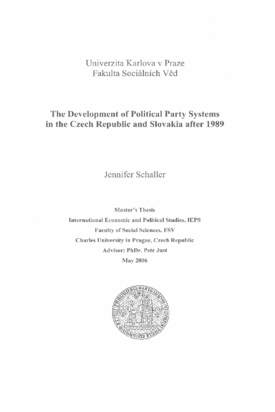The Development of Political Party Systems in the Czech Republic and Slovakia after 1989
The Development of Political Party Systems in the Czech Republic and Slovakia after 1989
diplomová práce (OBHÁJENO)

Zobrazit/
Trvalý odkaz
http://hdl.handle.net/20.500.11956/5956Identifikátory
SIS: 2188
Katalog UK: 990005217310106986
Kolekce
- Kvalifikační práce [19618]
Autor
Vedoucí práce
Oponent práce
Krausz Hladká, Malvína
Fakulta / součást
Fakulta sociálních věd
Obor
Mezinárodní ekonomická a politická studia
Katedra / ústav / klinika
Katedra politologie
Datum obhajoby
30. 6. 2006
Nakladatel
Univerzita Karlova, Fakulta sociálních vědJazyk
Angličtina
Známka
Výborně
The transition to democracy and consolidation of democracy in Central and Eastern Europe is a widely debated topic within the study of comparative politics. Nearly twenty years after embarking on the democratization and economic liberalization path, most of these states have emerged with stable and internationally accepted democratic systems. The literature on democratization has identified many different factors that contribute to the success of democracy (its stabilization and consolidation) in post communist states. One of the crucial factors in the development of democracy is institution-building. New democratic states must rapidly and decisively put democratic institutions in place in order to be able to carry out the procedures related to democracy. Institutions include not only the governing bodies, but also political parties, which form the basis of political competition. The development and maintenance of political parties is crucial to newly-formed democracies, and the ability of parties to win elections, survive, and adapt is one important indicator of the successful functioning of democracy. Studies of newly-formed or renewed political parties and political party systems focus on the contexts and conditions for their development, incorporating a variety of variables that account for differences...
